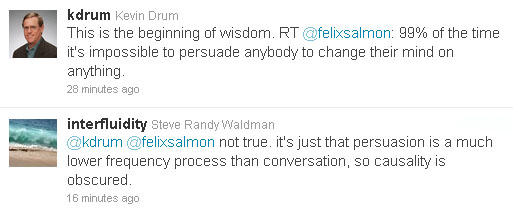Here is a brief Twitter conversation from this morning:

Actually, I think Steve is right, which just goes to show that Steve is right. My own experience, which I think is fairly generalizable, is that within the course of a single conversation hardly anybody ever changes their mind — including me. Arguing is a dominance game, and in a face-to-face confrontation over anything of significance (virtual or otherwise) we hairless apes will go to considerable lengths to avoid conceding dominance. So if we find ourselves on the losing end of a confrontation, we end up simply switching to new arguments, trying to redefine the terms of debate, cherry-picking our evidence a little differently, burrowing down into ever more trivial sub-arguments, or reverting to mockery and then walking away. In other words, pretty much anything other than actually conceding that someone else is right and that our worldview might need to be updated.
However, that’s only the immediate dynamic. With some frequency — 10% of the time? 20%? In any case, certainly more than 1% — arguments will start to sink in maybe a day or a week later when the emotional charge has worn off. You’ll probably never know that you’ve successfully persuaded your adversary, since it’s a gradual change that happens offstage and is rarely acknowledged (dominance games again), but it happens. That’s especially true if the arguments get repeated over time, and even more especially true if they get repeated by people in positions of respect. The number of people who refuse to change their minds regardless of the evidence is still large, since evidence isn’t really what underlies most of our beliefs, but it’s less than 99%.
Thus politics.

















